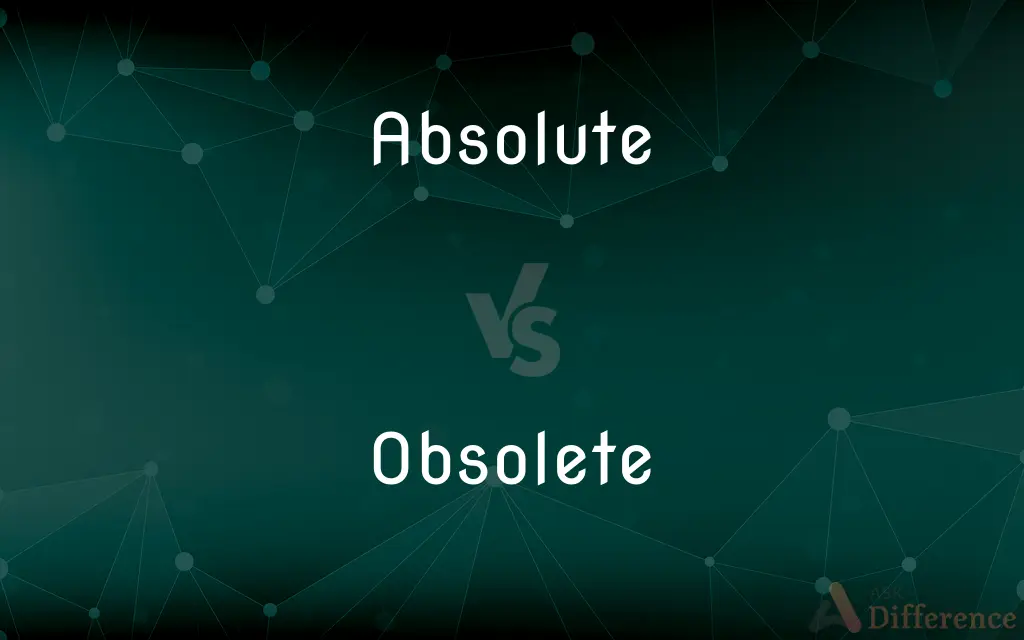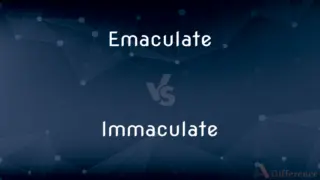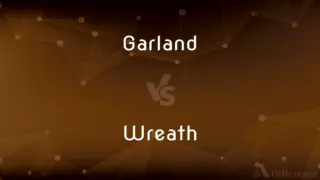Absolute vs. Obsolete — What's the Difference?
By Tayyaba Rehman & Urooj Arif — Updated on March 14, 2024
Absolute refers to something total, complete, or not subject to limitations, whereas obsolete denotes something outdated or no longer in use, often replaced by newer alternatives.

Difference Between Absolute and Obsolete
Table of Contents
ADVERTISEMENT
Key Differences
Absolute stands for an unchangeable, complete state or quality, indicating total authority or an unconditional fact. Whereas, obsolete signifies something that has fallen out of use or practice, often because it has been superseded by newer, more efficient alternatives.
In the context of authority or power, absolute denotes an unrestricted, supreme level of control or command, often used in political or philosophical discussions. On the other hand, obsolete in a technological or cultural context refers to products, ideas, or methods that are no longer considered useful or relevant.
When discussing concepts, laws, or principles, absolute is used to describe those that are universally true or applicable, without exceptions. Conversely, obsolete can describe concepts or practices that have become irrelevant or inappropriate due to changes in society, technology, or knowledge.
The term absolute can also refer to purity or perfection, as in absolute alcohol or absolute zero, where it signifies a degree of concentration or a precise scientific condition. Obsolete, however, often describes objects or technologies, indicating that they have been replaced by more modern or efficient versions.
In philosophical or moral discussions, absolute values or truths are those considered to be universally valid or inherently right, regardless of context or perspective. Obsolete moral practices or beliefs, by contrast, are those that society has moved beyond, recognizing them as outdated or no longer applicable.
ADVERTISEMENT
Comparison Chart
Definition
Complete, unconditional, not subject to any limitation
Outdated, no longer used, replaced by something newer
Context
Authority, principles, purity
Technology, cultural practices, methods
Application
Describes universal truths, supreme power, or purity
Refers to outdated or irrelevant objects, ideas, or methods
Connotation
Often positive, implying perfection or totality
Generally negative, indicating redundancy or irrelevance
Examples
Absolute monarchy, absolute zero
Obsolete technology, obsolete terminology
Compare with Definitions
Absolute
Pure form.
Absolute alcohol is 100% ethanol without impurities.
Obsolete
No longer in use.
Typewriters have become obsolete with the advent of computers.
Absolute
Ultimate standard.
Absolute zero is the lowest possible temperature where nothing could be colder.
Obsolete
Superseded by newer alternatives.
Floppy disks became obsolete due to USB drives.
Absolute
Unconditional truth.
Scientists search for absolute truths in the universe.
Obsolete
Outdated technology.
VHS tapes are obsolete in the era of digital streaming.
Absolute
Complete authority.
An absolute monarch rules without any legal limitations.
Obsolete
Irrelevant practices.
Some traditional marketing strategies are now considered obsolete.
Absolute
Final or total.
The judge’s decision was absolute, leaving no room for appeal.
Obsolete
Discontinued models.
The older model of the phone was made obsolete by the new release.
Absolute
Unqualified in extent or degree; total
Absolute silence.
Obsolete
No longer in use
An obsolete word.
Absolute
Not limited by restrictions or exceptions
An absolute right.
Obsolete
Outmoded in design, style, or construction
An obsolete locomotive.
Absolute
Being fully such; utter
An absolute fool.
Obsolete
(Biology) Vestigial or rudimentary, especially in comparison with related or ancestral species, as the tailbone of an ape. Used of an organ or other part of an organism.
Absolute
Unconstrained by constitutional or other provisions
An absolute ruler.
Obsolete
To cause to become obsolete
"The textbook publishers use every trick known to the marketing mind to obsolete their products year after year, thus closing off the possibility of second-hand sales" (Thomas Frank).
Absolute
Not mixed; pure
Absolute oxygen.
Obsolete
(of words, equipment, etc.) No longer in use; gone into disuse; disused or neglected (often in favour of something newer).
It is speculated that, within a few years, the Internet's speedy delivery of news worldwide will make newspapers obsolete.
Absolute
Not to be doubted or questioned; positive
Absolute proof.
Obsolete
(biology) Imperfectly developed; not very distinct.
Absolute
Of, relating to, or being a word, phrase, or construction that is isolated syntactically from the rest of a sentence, as the referee having finally arrived in The referee having finally arrived, the game began.
Obsolete
To cause to become obsolete.
This software component has been obsoleted.
We are in the process of obsoleting this product.
Absolute
Of, relating to, or being a transitive verb when its object is implied but not stated. For example, inspires in We have a teacher who inspires is an absolute verb.
Obsolete
No longer in use; gone into disuse; disused; neglected; as, an obsolete word; an obsolete statute; - applied chiefly to words, writings, or observances.
Absolute
Of, relating to, or being an adjective or pronoun that stands alone when the noun it modifies is being implied but not stated. For example, in Theirs were the best, theirs is an absolute pronoun and best is an absolute adjective.
Obsolete
Not very distinct; obscure; rudimental; imperfectly developed; abortive.
Absolute
Relating to measurements or units of measurement derived from fundamental units of length, mass, and time.
Obsolete
To become obsolete; to go out of use.
Absolute
Relating to absolute temperature.
Obsolete
Old; no longer in use or valid or fashionable;
Obsolete words
An obsolete locomotive
Outdated equipment
Superannuated laws
Out-of-date ideas
Absolute
(Law) Complete and unconditional; final
An absolute divorce.
Obsolete
No longer in use;
Obsolete words
Absolute
Something that is absolute.
Absolute
Something regarded as the ultimate and transcendent basis of all thought and being. Used with the.
Absolute
Something regarded as exceeding or transcending everything else to the point of being independent and unrelated.
Absolute
Free of restrictions, limitations, qualifications or conditions; unconditional.
Absolute
Unrestricted by laws, a constitution, or parliamentary or judicial or other checks; (legally) unlimited in power, especially if despotic.
Absolute
Free from imperfection, perfect, complete; especially, perfectly embodying a quality in its essential characteristics or to its highest degree.
Absolute purity, absolute liberty
Absolute
Complete, utter, outright; unmitigated, not qualified or diminished in any way.
When caught, he told an absolute lie.
An absolute denial of all charges
You're an absolute genius!
Absolute
Positive, certain; unquestionable; not in doubt.
Absolute
(archaic) Certain; free from doubt or uncertainty (e.g. a person, opinion or prediction).
Absolute
Fundamental, ultimate, intrinsic; not relative; independent of references or relations to other things or standards.
The doctrine that absolute knowledge of things is possible, an absolute principle
Absolute rights and duties are such as pertain to man in a state of nature as contradistinguished from relative rights and duties, or such as pertain to him in his social relations.
Absolute
(physics) Independent of arbitrary units of measurement, standards, or properties; not comparative or relative.
Absolute velocity, absolute motion, absolute position
Absolute
Having reference to or derived in the simplest manner from the fundamental units of mass, time, and length.
Absolute
Relating to the absolute temperature scale (based on absolute zero); kelvin.
Absolute
(grammar) Not immediately dependent on the other parts of the sentence; not in a syntactical relation with other parts of a text, or qualifying the text as a whole rather than any single word in it, like "it being over" in "it being over, she left".
Absolute
(of a case form) Syntactically connected to the rest of the sentence in an atypical manner, or not relating to or depending on it, like in the nominative absolute or genitive absolute, accusative absolute or ablative absolute.
Absolute
(of an adjective or possessive pronoun) Lacking a modified substantive, like "hungry" in "feed the hungry".
Absolute
Expressing a relative term without a definite comparison, like "older" in "an older person should be treated with respect".
Absolute
Positive; not graded (not comparative or superlative).
Absolute
(of a usually transitive verb) Having no direct object, like "kill" in "if looks could kill".
Absolute
(of Celtic languages) Being or pertaining to an inflected verb that is not preceded by any number of particles or compounded with a preverb.
Absolute
(math) As measured using an absolute value.
Absolute deviation
Absolute square
Mean absolute difference
Absolute
(math) Indicating an expression that is true for all real numbers, or of all values of the variable; unconditional.
Absolute
(education) Pertaining to a grading system based on the knowledge of the individual and not on the comparative knowledge of the group of students.
Absolute
Independent of (references to) other arts; expressing things (beauty, ideas, etc) only in one art.
Absolute music
Absolute
Indicating that a tenure or estate in land is not conditional or liable to terminate on (strictly) any occurrence or certain kinds of occurrence.
A freehold property is an estate in fee simple absolute in possession.
Absolute
(obsolete) Absolved; free.
Absolute
That which exists (or has a certain property, nature, size, etc) independent of references to other standards or external conditions; that which is universally valid; that which is not relative, conditional, qualified or mitigated.
Moral absolutes
Absolute
(geometry) In a plane, the two imaginary circular points at infinity; in space of three dimensions, the imaginary circle at infinity.
Absolute
A realm which exists without reference to anything else; that which can be imagined purely by itself; absolute ego.
Absolute
The whole of reality; the totality to which everything is reduced; the unity of spirit and nature; God.
Absolute
(chemistry) A concentrated natural flower oil, used for perfumes; an alcoholic extract of a concrete.
Absolute
Loosed from any limitation or condition; uncontrolled; unrestricted; unconditional; as, absolute authority, monarchy, sovereignty, an absolute promise or command; absolute power; an absolute monarch.
Absolute
Complete in itself; perfect; consummate; faultless; as, absolute perfection; absolute beauty.
So absolute she seems,And in herself complete.
Absolute
Viewed apart from modifying influences or without comparison with other objects; actual; real; - opposed to relative and comparative; as, absolute motion; absolute time or space.
Absolute
Loosed from, or unconnected by, dependence on any other being; self-existent; self-sufficing.
Absolute
Capable of being thought or conceived by itself alone; unconditioned; non-relative.
To Cusa we can indeed articulately trace, word and thing, the recent philosophy of the absolute.
Absolute
Positive; clear; certain; not doubtful.
I am absolute 't was very Cloten.
Absolute
Authoritative; peremptory.
The peddler stopped, and tapped her on the head,With absolute forefinger, brown and ringed.
Absolute
Pure; unmixed; as, absolute alcohol.
Absolute
Not immediately dependent on the other parts of the sentence in government; as, the case absolute. See Ablative absolute, under Ablative.
Absolute
In a plane, the two imaginary circular points at infinity; in space of three dimensions, the imaginary circle at infinity.
Absolute
Something that is conceived to be absolute; something that does not depends on anything else and is beyond human control;
No mortal being can influence the absolute
Absolute
Perfect or complete or pure;
Absolute loyalty
Absolute silence
Absolute truth
Absolute alcohol
Absolute
Complete and without restriction or qualification; sometimes used informally as intensifiers;
Absolute freedom
An absolute dimwit
A downright lie
Out-and-out mayhem
An out-and-out lie
A rank outsider
Many right-down vices
Got the job through sheer persistence
Sheer stupidity
Absolute
Not limited by law;
An absolute monarch
Absolute
Expressing finality with no implication of possible change;
An absolute (or unequivocal) quarantee to respect the nation's authority
Inability to make a conclusive (or unequivocal) refusal
Absolute
Without conditions or limitations;
A total ban
Absolute
Not capable of being violated or infringed;
Infrangible human rights
Common Curiosities
Can a technology be absolute?
Technologically speaking, absolute isn’t typically used in relation to technology, which evolves over time, whereas technology can become obsolete.
Is absolute always a positive term?
While absolute can imply perfection or totality, in certain contexts (like absolute power) it might have negative connotations.
How do concepts become obsolete?
Concepts may become obsolete due to advancements in knowledge, technology, or changes in societal values and norms.
What does absolute mean?
Absolute refers to something complete, total, or not subject to any limitations or conditions.
What defines something as obsolete?
Something is considered obsolete when it's no longer in use, often because it has been replaced by more efficient or modern alternatives.
Can an obsolete idea become relevant again?
Yes, ideas or technologies considered obsolete can regain relevance if circumstances change or if they offer unique value in new contexts.
Why do products become obsolete?
Products often become obsolete due to technological advancements, changing consumer preferences, or improvements in efficiency and functionality.
What's the difference between obsolete and outdated?
Obsolete implies something is no longer used at all, while outdated may still be in use but has been surpassed by better options.
What role does innovation play in making something obsolete?
Innovation introduces new methods, ideas, or products that can make existing ones obsolete by offering superior alternatives.
Is it possible for a moral principle to be absolute?
Yes, certain moral principles are considered absolute, believed to be universally valid regardless of situation or context.
Can absolute and obsolete apply to the same object?
It's unusual for both terms to apply simultaneously to the same object, as their meanings are fundamentally different.
Can a law be absolute?
A law can be considered absolute if it is universally applicable and admits no exceptions.
How do societies determine what is obsolete?
Societal consensus, technological advancements, and shifts in cultural values often determine what becomes obsolete.
Can personal beliefs become obsolete?
Personal beliefs can become obsolete if they no longer align with new information, societal norms, or personal growth.
What is the significance of understanding absolute and obsolete concepts?
Understanding these concepts helps in comprehending the nature of change, progress, and the enduring nature of certain truths or principles.
Share Your Discovery

Previous Comparison
Emaculate vs. Immaculate
Next Comparison
Garland vs. WreathAuthor Spotlight
Written by
Tayyaba RehmanTayyaba Rehman is a distinguished writer, currently serving as a primary contributor to askdifference.com. As a researcher in semantics and etymology, Tayyaba's passion for the complexity of languages and their distinctions has found a perfect home on the platform. Tayyaba delves into the intricacies of language, distinguishing between commonly confused words and phrases, thereby providing clarity for readers worldwide.
Co-written by
Urooj ArifUrooj is a skilled content writer at Ask Difference, known for her exceptional ability to simplify complex topics into engaging and informative content. With a passion for research and a flair for clear, concise writing, she consistently delivers articles that resonate with our diverse audience.
















































